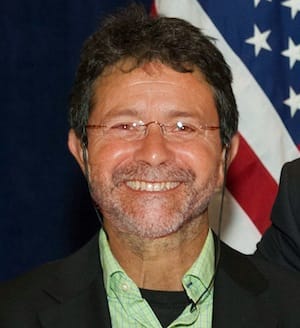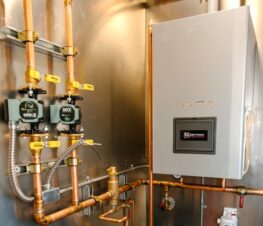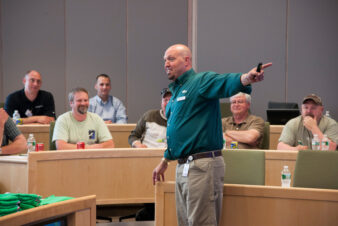For those of us working toward smarter, cleaner, cheaper water heating for households, there’s a lot happening in Washington, D.C. With about 15% of U.S. household energy use going to heat the water we use to wash dishes and take showers, even small improvements make a big difference.
First, new energy efficiency standards for water heaters issued by the U.S. Department of Energy (DOE) take effect Thursday (April 16). These standards were finalized in April 2010, giving the water heater industry time to plan and make necessary investments to manufacture the more efficient versions as of April 16. DOE estimates that these new standards will net consumers savings of up to $8.4 billion over the next 30 years. Total energy savings through 2045 are an estimated 2.6 quads, about as much energy as used by 15 million households annually. NRDC is a longstanding and strong supporter of federal energy efficiency standards, and had pushed for these standards to be adopted. It’s good to see them go into effect.
A key aspect of the new standards is that large electric water heaters (over 55 gallons) will use heat pump technology, which can cut energy use by more than 50%. That’s a huge improvement — these heaters will use less than half the energy of electric resistance water heaters. Boding well for the future of efficient, economic water heating, manufacturers have also introduced heat pump water heaters in the highly popular 50-gallon size. This is great news, and holds enormous promise for energy and consumer savings beyond what DOE estimated.
Second, with strong bipartisan support, the U.S. Senate recently passed S. 535 Energy Efficiency Improvement Act of 2015 introduced by Senators Portman (OH) and Shaheen (NH), including a provision to exempt “grid-enabled water heaters” from the federal energy efficiency standards for large water heaters. These are large electric resistance water heaters with communication and control capability that allow them to be used as low-cost thermal batteries in an energy storage or demand response program (demand response involves consumers temporarily changing their normal consumption in response to pricing or incentives at times of high wholesale electricity costs or reliability concerns). This can make the electricity system more flexible and ready to use renewable generation with variable output, like wind and solar. Smart grid-responsive water heaters present a promising possibility for a more efficient, more economic, and ultimately lower-emissions electricity system, even if they are less efficient individually. There’s much more to be learned about the possible role of smart water heaters and the trade-offs between system and component efficiency, and the legislation we support would foster much better understanding.
I had the pleasure of testifying in favor of water heater legislation a few weeks ago before the House of Representatives Subcommittee on Energy and Power. The House of Representatives passed legislation similar to S. 535 in 2014 with overwhelming bipartisan support. Hopefully, the House will once again pass legislation in the current Congress, and grid-enabled water heaters will have a clear path forward to the president’s desk. So the good news is we’re making progress, although there’s no date set yet for House action.
NRDC has only rarely supported exemptions from standards, but here we explored the opportunities that grid-enabled water heaters may offer for environmental and consumer benefit, found the case persuasive, and worked intensively with manufacturers, utilities, and other efficiency and environmental organizations to develop legislation that would deliver on the opportunity while not undermining the benefits of the new water heater efficiency standards. Importantly, the legislation is carefully designed to make sure that these water heaters are actually used in a demand response or energy storage program, and not a loophole to avoid the efficiency standards. Typically, legislation isn’t required to carve out a sensible exemption; DOE has the authority to adopt a waiver on its own. Here, however, DOE recently inexplicably decided to withdraw its own 2013 proposal for a waiver process for grid-enabled water heaters — an idea that manufacturers, utilities, and NRDC had all supported – making legislation necessary.
Looking ahead, we’ll continue to support the legislation on grid-enabled water heaters until it is enacted, and continue to promote smart, economic water heating of all types, including heat pump water heaters of all sizes.
And of course we’ll continue our longstanding work on great energy standards that deliver environmental and consumer benefits on a wide range of appliances.
 Robin Roy is the director of Building Energy and Clean Energy Strategy at the Natural Resources Defense Council. You can read more from Robin here.
Robin Roy is the director of Building Energy and Clean Energy Strategy at the Natural Resources Defense Council. You can read more from Robin here.




Join the conversation: